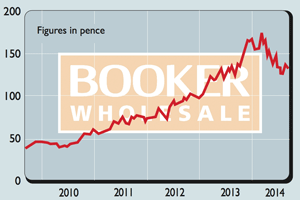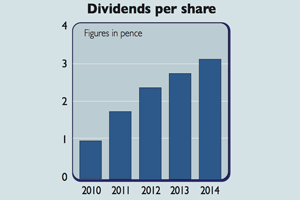Shares in focus: Stock up on this cash-and-carry
Food wholesaler Booker Group is a good business with a price to match. Should you buy in anyway? Phil Oakley investigates.
Get the latest financial news, insights and expert analysis from our award-winning MoneyWeek team, to help you understand what really matters when it comes to your finances.
You are now subscribed
Your newsletter sign-up was successful
Want to add more newsletters?

Twice daily
MoneyWeek
Get the latest financial news, insights and expert analysis from our award-winning MoneyWeek team, to help you understand what really matters when it comes to your finances.

Four times a week
Look After My Bills
Sign up to our free money-saving newsletter, filled with the latest news and expert advice to help you find the best tips and deals for managing your bills. Start saving today!
If you're able to take a long view, Booker's shares are worth a punt, says Phil Oakley.
Booker can trace its roots back to the 1830s, but today is best known for its cash-and-carry business. It is mainly a wholesaler of food to small retailers, caterers and small businesses, and it trades under the Booker and Makro brands.
The company used to have its fingers in many pies, including fish processing, food manufacturing, seeds, and even the rights to Agatha Christie's novels. Back in the late 1990s there were doubts that the company would survive, as it was weighed down by lots of debt.
MoneyWeek
Subscribe to MoneyWeek today and get your first six magazine issues absolutely FREE

Sign up to Money Morning
Don't miss the latest investment and personal finances news, market analysis, plus money-saving tips with our free twice-daily newsletter
Don't miss the latest investment and personal finances news, market analysis, plus money-saving tips with our free twice-daily newsletter
It survived by slimming itself down and concentrating on its cash-and-carry business before it was bought by the supermarket company Iceland in 2000.
Since 2005 Booker has been a separate company once again, and it's been agreat success for most of that time.
Under the leadership of the former director of Marks & Spencer,Charles Wilson (who owns around 6% of the business), the company has been able to grow its sales and profits at very healthy rates.
As a result, its shares became a firm favourite with professional fund managers. So the question is: after such a stellar run, can investors continue to make money owning the shares?
The outlook
At first glance, it's very easy to dismiss a business like Booker. Just under 60% of its sales are made to small independent food retailers that operate in a fiercely competitive market. What's more, nearly a third of sales come from tobacco a declining market.
Yet Booker has been very good at thriving in a sector where some of its bigger rivals, such as Tesco, have been suffering. The strength of the business is its focus on keeping things simple. Over the last six to seven years it has been cutting prices and making itself more competitive compared to its rivals.
It has also been a lot more attentive to what its customers want in terms of product ranges and quality. Customer satisfaction levels have improved a lot. As a result, like-for-like sales (a key performance measure in this sector) have been growing strongly over this period.
In other words, Booker has been growing sales at its existing outlets. The company has also been getting out of selling unprofitable products and steadily reducing its dependence on tobacco sales.
Booker now has annual sales of £4.8bn and is looking to increase this to £6bn over the next three to four years. There's a good chance that it will be able to do this. The company is also making a big push into the catering trade and has some large customers, such as HM Prison Service and Aramark, a big contract caterer.
Underlying sales in this part of the business grew by more than 7% last year and this is a good hedge against a difficult food-retailing market.
Having said that, although parts of the food-retail industry are struggling, Booker is exposed to one of the fastest-growing segments of the food-retailing sector convenience stores. It owns the Premier brand of local food stores and has nearly 3,000 of them across the UK.
This means that Booker's food wholesale business has one very secure customer, and it's also an opportunity for Booker to profit from the growing trend for households to do smaller and more frequent shops.
Booker's business was also boosted by the acquisition of the Makro cash-and-carry business from German retailer Metro back in 2012. At that time the Makro business was losing £20m per year.
It is now making a profit of £11m. Booker and Makro are working together to make the entire cash-and-carry business more efficient with a better offer for customers. They are trialling new stores and the initial signs are encouraging.
Another thing to like about Booker is its immaculate finances and performance. It had nearly £150m of cash on the balance sheet at the end of March and no debt. The company is also very good at generating lots of surplus cash flow.
Last year, free cash flow was more than its net profits, which shows that the quality of its profits is very good. In fact, Booker has so much cash it doesn't know what to do with it. So it is giving it back to shareholders. It's recently given back 3.5p per share in the form of a B share, which shareholders can redeem for cash.
The company wants to repeat this B share issue in 2015. Combine this with a rising dividend, and you are set to get a reasonable return from the shares even if the share price doesn't move at all.
Should you buy the shares?
Booker is a very good business, as shown by a return on capital employed (ROCE) of 19%. The trouble is, the stock market already knows this and prices the shares on nearly 19 times expected earnings for 2015. And that's after a recent fall in the share price when Metro sold its stake.
Normally, such a rating is too rich for me it can only make sense to invest in such a highly rated company if the firm has the potential to grow profits strongly for the next few years.
Booker is clearly doing something right in a sector where others are struggling, and that makes me think that Bookercould indeed deliver strong profitsgrowth.
However, in order to make any decent money from buying now, you will have to beprepared to take a long-term view by which I mean five years or more. But it just might be worth taking the plunge.
View: a long-term buy
Bookers (LSE: BOK)


Buy: 7
Hold: 3
Sell: 2
Target price: 177p
Directors' shareholdings
C Wilson (CEO): 108,241,986
J Prentis (CFO): 10,413,807
R Rose (Chair): 910,282
Get the latest financial news, insights and expert analysis from our award-winning MoneyWeek team, to help you understand what really matters when it comes to your finances.
Phil spent 13 years as an investment analyst for both stockbroking and fund management companies.
-
 Should you buy an active ETF?
Should you buy an active ETF?ETFs are often mischaracterised as passive products, but they can be a convenient way to add active management to your portfolio
-
 Power up your pension before 5 April – easy ways to save before the tax year end
Power up your pension before 5 April – easy ways to save before the tax year endWith the end of the tax year looming, pension savers currently have a window to review and maximise what’s going into their retirement funds – we look at how